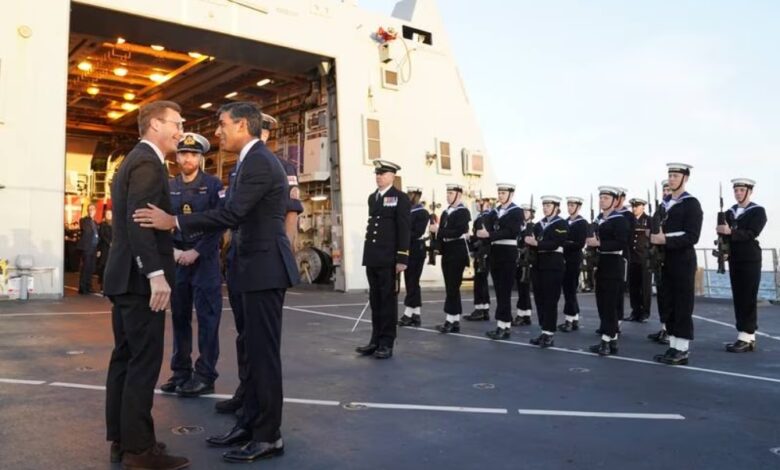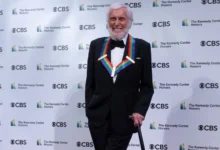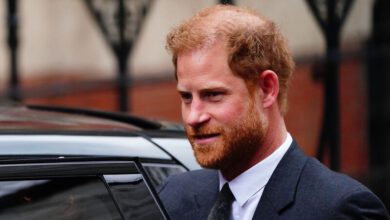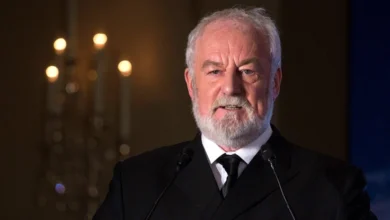Britain intends to deploy 20,000 troops to Northern Europe as a deterrent against Russia.
Heads of the 10-nation Joint Expeditionary Force call on defence leaders to safeguard vital infrastructure against acts of sabotage.


The UK has committed to deploying 20,000 troops to northern Europe next year, with the aim of safeguarding the Baltic Sea region and preventing potential disruption of a network of undersea cables by Russia.
Prime Minister Rishi Sunak announced this commitment during a summit in Sweden, which included members of the 10-nation Joint Expeditionary Force. This coalition of Baltic and North Sea militaries is intensifying its exercises to deter Russian aggression.
Ukraine was invited to observe the group’s exercises on Friday, as President Volodymyr Zelenskyy urged leaders to remain vigilant against hybrid threats from Russia this winter.
The summit, held on the island of Gotland, followed a mysterious leak on a pipeline connecting Finland to Estonia, prompting speculation of possible sabotage. Similar concerns arose last year with damage to the Nord Stream gas pipelines beneath the Baltic, highlighting concerns over critical infrastructure safety.
Swedish Prime Minister Ulf Kristersson emphasised the significance of the undersea infrastructure, describing it as a vital component for digital data traffic and overall digital control. He announced that the 10 participating countries – the UK, Sweden, Denmark, Finland, Norway, Estonia, Latvia, Lithuania, Iceland, and the Netherlands – have tasked their defence ministers with devising strategies to safeguard this infrastructure.
Downing Street disclosed that the UK’s contribution would comprise 20,000 troops, eight warships, and a fleet of helicopters for exercises, air patrol, and cold weather training in the region. This initiative aims to bolster efforts in identifying, deterring, and mitigating both conventional and hybrid threats. Additionally, a carrier strike group led by the warship HMS Queen Elizabeth will spearhead the UK’s involvement in Nato’s most ambitious drill since the Cold War, Exercise Steadfast Defender, scheduled for next year.


“Emphasising the critical importance of Northern Europe to our national security, Chancellor Sunak underscored the need for close collaboration with our Joint Expeditionary Force partners in safeguarding our interests and deterring hybrid threats,” stated Mr. Sunak.
He pointed to the recent Israel-Hamas conflict as a stark reminder that “our security cannot be taken lightly… it is imperative that we remain unified against those harbouring malicious intentions”.
The Joint Expeditionary Force is gearing up for its own exercise, named Joint Protector, slated for next year. Leaders of the coalition stressed the necessity of being prepared to respond in situations that may not meet the threshold for Nato’s Article 5 mutual defence commitment.


The concept of hybrid warfare encompasses acts such as sabotage, cyber assaults, and economic threats, all of which have been attributed to Russia. Last winter, Moscow’s forces relentlessly targeted Ukraine’s energy grid using drones and missiles.
Speaking via video link at the summit, Mr. Zelenskyy emphasised the need to focus on the hybrid terrorist threats posed by Russia before the onset of winter.
“We witnessed last year the Kremlin’s strategy, which involved targeting energy infrastructure to undermine the foundations of modern life. We anticipate that this winter, Russia will attempt to replicate these tactics, albeit on a larger scale.”
Sweden is still awaiting approval from Turkey and Hungary for its NATO membership application, more than a year after the initial request. On Friday, it entered into a separate agreement with the UK, committing to a “regular schedule” of joint exercises with its military allies and designating the JEF as an “additional layer of security” for northern Europe.
Finnish President Sauli Niinisto, whose country became a NATO member in April, urged Sweden to join the alliance “at the earliest opportunity.” However, he noted that Turkish President Recep Tayyip Erdogan holds the key to the solution.









